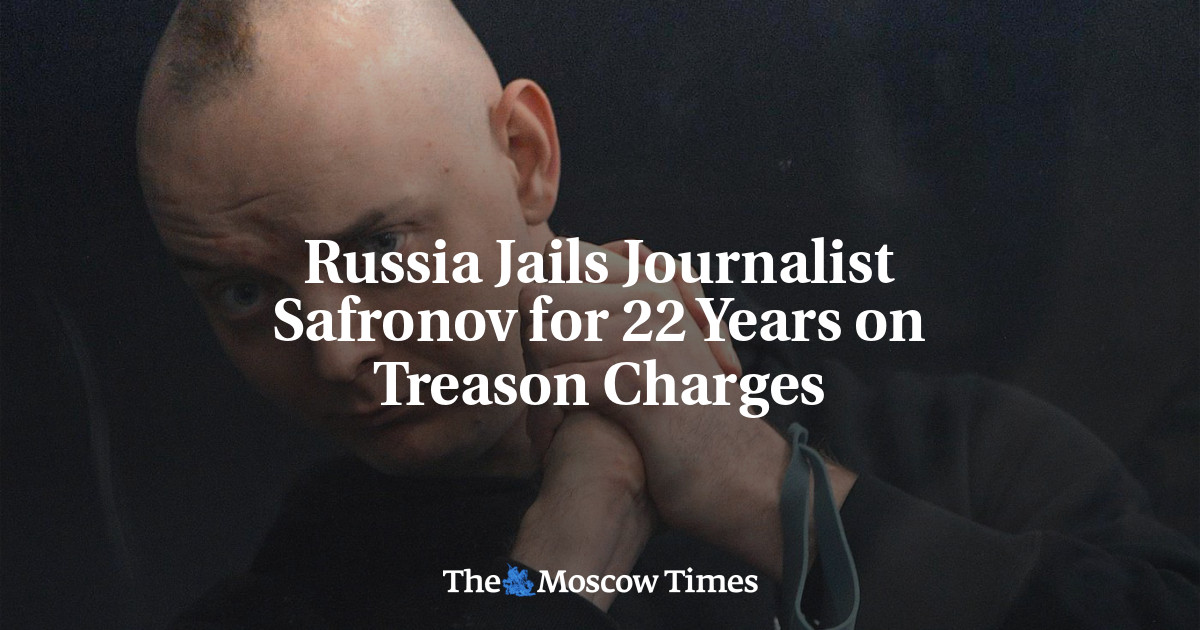
A Moscow court sentenced reporter Ivan Safronov to 22 years in prison Monday, Russia’s first treason conviction for a journalist since 2001.
Safronov, a defense journalist at top Russian newspapers Kommersant and Vedomosti who went on to work for state space agency Roscosmos, was convicted of collecting secret information about the Russian military and handing it to spies for the Czech Republic.
The reporter denies the accusations and says his prosecution is “directly related to his journalism.” Supporters believe the case is revenge for reporting on Russian arms deals.
Safronov’s supporters chanted “freedom” and applauded the journalist as the verdict was read out. His legal defense team said they will appeal the verdict, which was two years less than the 24 years requested by prosecutors.
“I will write to everyone. Write to me. I love you,” Safronov, 32, said before he was taken out of the courtroom.
The case has involved significant legal violations, according to Safronov’s legal team, who point out that even prosecution witnesses said in court that Safronov “did not break the law.”
“Any prison term — even one year — is too much,” said lawyer Ivan Pavlov, who was involved in Safronov’s defense before fleeing Russia last year.
The criminal case against Safronov was retaliation for a 2019 article in newspaper Kommersant on Moscow’s sale of fighter jets to Cairo that triggered a diplomatic scandal, the BBC Russian Service reported last week, citing correspondence between Egyptian and Russian officials.
Ahead of the court hearing on Monday, a number of Russian media outlets, including Meduza, TV Rain, Novaya Gazeta Europe and The Moscow Times’ Russian Service, released a statement advocating for Safronov's release.
“The reason for Ivan Safronov’s persecution is not ’treason’, which has not been proven, but his journalistic work,” the joint statement said.
Russian officials have insisted the case is not related to Safronov’s work as a journalist.
Russian President Vladimir Putin said incorrectly in 2020 that the criminal case concerned Safronov’s work at Roscosmos, but the Kremlin later claimed this was “a slip of the tongue.”
Though case materials are classified, investigative media outlet Proekt published a copy of the indictment last week, arguing the “state secrets” Safronov is alleged to have divulged were mostly available online.
“All our attempts to add anything that would bear witness to the innocence of Ivan… were blocked at every stage of the investigation and court proceedings,” Safronov’s lawyer Yevgeny Smirnov told The Moscow Times.
Safronov has also been subjected to pressure throughout the investigation, his lawyers said.
“From the first day of his arrest, Ivan has been constantly pushed to confess to his alleged crime — and they did not shy away from using any methods,” Smirnov said.
Last week, during a closed-door court hearing, Russian prosecutors offered Safronov a 12-year sentence in exchange for a guilty plea, according to his lawyers.
Safronov refused to take that plea bargain.
Investigators previously tried to force Safronov to take a plea deal in exchange for a phone call to his mother, which Safronov also refused.
Lawyers representing Safronov have also come under unprecedented pressure.
Both Smirnov and Pavlov fled Russia last year.
In a separate case, Safronov lawyer Dmitri Talantov was arrested in June for allegedly “discrediting” the Russian army.
“I have never seen such pressure against lawyers during my 25 years of legal practice,” said Pavlov, who was made a suspect in a criminal investigation after he was accused of allegedly divulging confidential information about the Safronov case.
Safronov was described by his former colleagues and Russian journalists as a professional journalist with high level contacts in the defense sector.
From 2010 to 2019, he was a reporter for business newspaper Kommersant. When forced to quit following an article about a top Russian official, the entire politics desk walked out in protest. Before taking a job as a public communications adviser to the head of Roscosmos in 2020, he worked as a reporter for Vedomosti.
Safronov’s father, Ivan Safronov, who also worked for Kommersant covering the defense industry, died in 2007 after falling from a window. Investigators concluded he killed himself, but some questioned the official version, pointing out that at the time of his death he was working on a story about secret Russian arms deliveries to Iran and Syria.
The Safronov case is the first treason case against a Russian journalist since 2001 when reporter Grigory Pasko, who revealed a number of environmental violations by the Russian Navy, was sentenced to four years in prison.
“This [criminal case] is a signal to the entire journalistic community and especially to those who report about the military,” Smirnov said.
Alexandra Dzhordzhevich, who worked with Safronov at Kommersant, told The Moscow Times that defense reporters have become “more worried” as a result of the case.
“Many journalists have stopped writing about the military or left journalism,” Dzhordzhevich, who is no longer a reporter, told The Moscow Times.
“It was great working with Vanya, I miss that time so much,” she said.
#Russia #Jails #Journalist #Safronov #Years #Treason #Charges
https://www.globalcourant.com/russia-jails-journalist-safronov-for-22-years-on-treason-charges/?feed_id=20484&_unique_id=6315fc7e3cea0